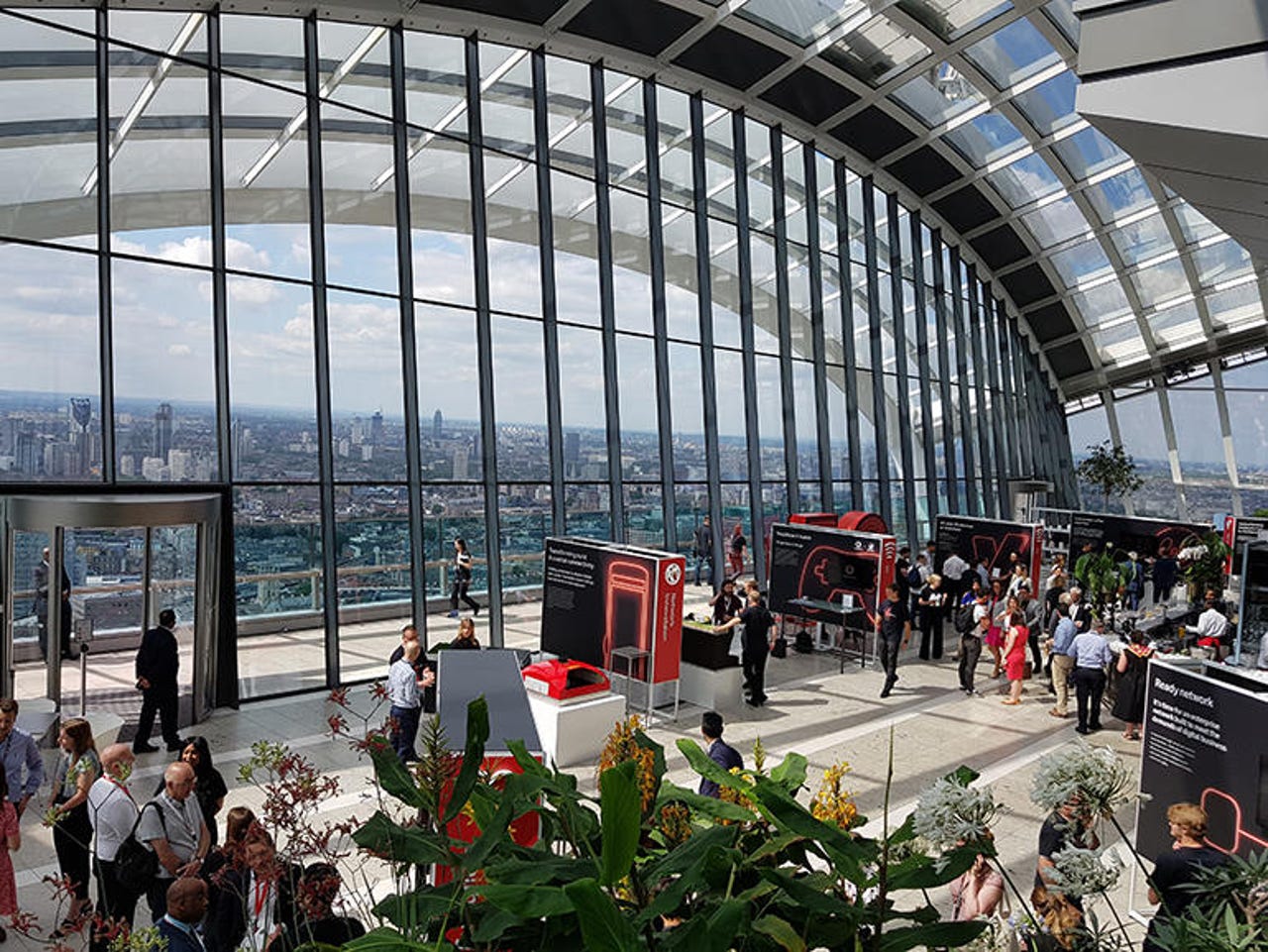Vodafone switches on 5G network in the UK, introduces new plans for businesses

Vodafone's 5G launch event took place in the Sky Garden, atop London's 'Walkie Talkie' building (a.k.a. 20 Fenchurch Street).
Vodafone has switched on its 5G network in the UK — or parts of it. Specifically, Vodafone 5G services are now available in seven cities — Birmingham, Bristol, Cardiff, Glasgow, Manchester, Liverpool and London. There is also 5G connectivity available at Vodafone's Newbury HQ and in the Scilly Isles — the latter being a test case for how 5G will transform rural areas.
The London launch saw the impact of a rugby tackle made by Will Rowlands at the Ricoh stadium in Coventry transferred via 5G to Wasps teammate Juan de Jongh, who was wearing a specially developed haptic suit on-stage in London.
Vodafone is the second UK mobile network to launch 5G, following EE at the end of May. By the end of the year, another 12 cities -- Birkenhead, Blackpool, Bournemouth, Guildford, Newbury, Portsmouth, Plymouth, Reading, Southampton, Stoke-on-Trent, Warrington and Wolverhampton -- will be added to Vodafone's 5G coverage map.
The potential speed and latency benefits of 5G are widely appreciated, but Vodafone's CTO Scott Petty stressed that there's more on offer. "Yes, 5G can be ten times faster than 4G -- but in the next couple of years, as we harness new features and new capabilities, it will get even faster. Latency today is already around 30 milliseconds, and will reach 10 milliseconds over the next couple of years," he said.
"I actually think 5G is about so much more. It's about the new devices that will be connected to our network -- augmented reality and virtual applications, online gaming devices, in enterprises, connected cities, connected buildings, healthcare services. I'm very confident over the next few years that we'll see more things connected to our network than smartphones."
Vodafone is offering three unlimited data plans for businesses at no extra cost over 4G. Business Unlimited Lite, aimed at small businesses, costs £19.16/month (ex. VAT). Business Unlimited is tailored for professional services and costs £21.66/month (ex. VAT). Business Unlimited Max provides unlimited data and the fastest 5G available plus the most roaming destinations, from £25/month (ex. VAT).
Vodafone's Business Add Ons portfolio will also extend to SMEs as well as SOHO customers. These include: One Net Anywhere (a virtual landline), Rapid Insurance (four-hour device replacement), Paypal Here, Device Support, Prime Contact and Business Support. A digital marketplace is also planned for later in the year. This will enable small businesses to purchase productivity and security apps direct, paying via their monthly mobile bill.
Vodafone's current 5G services are based on mid-band spectrum, but Vodafone's roadmap sees low-band spectrum coming on-stream in the 2020/21 timeframe, following the ratification of the Rel16 (standalone 5G) standards. This will offer better coverage for rural areas.
Overshadowing all 5G network development, in the UK and elsewhere, is the question of Huawei's involvement due to concerns over the security of the Chinese company's network equipment and political pressure from the Trump administration. UK telcos are currently waiting on a review from the Department for Culture, Media and Sport (DCMS) as to whether Huawei equipment can be used in 5G networks.
Vodafone currently is using Huawei equipment in about a third of its Radio Access Network (RAN). "We don't use Huawei in the core, so hopefully the DCMS review will come out and say 'yes, that's still OK', and we'll continue on," Petty said.
And if Huawei equipment had to be pulled from Vodafone's RAN? "Right now, you're talking about 150 to 200 base stations. Six months from now, 400 to 500. You're talking fifty, sixty, seventy million [pounds] to replace -- and you replace those instead of doing 500 new ones," Petty said. "The other problem is, who would you use? We've always said we want a really healthy ecosystem where we can balance market share, and we've done that in the RAN with Huawei and Ericsson."
Is it likely that the current row will blow over? "The discussions at the security agencies are about how to run architecture and security the right way, and I think the politics are heading in the right direction as well," Petty said.
And if the politics go the other way? That would be a shame because China is an important player in 5G and Europe can be an important player, Petty said. "If we isolate ourselves from that, it's not just radio and core, it's the entire supply chain around devices, and I think that would be a mistake. From the RAN, I really don't see much risk: so manage the core, manage the security, and let us participate in that ecosystem."
READ MORE ON 5G
Real world 5G not ready for primetime in 2019
Ericsson to build 'fully-automated' 5G factory in the US by early 2020
How 'Private 5G' could enable Google and Amazon to become telcos
